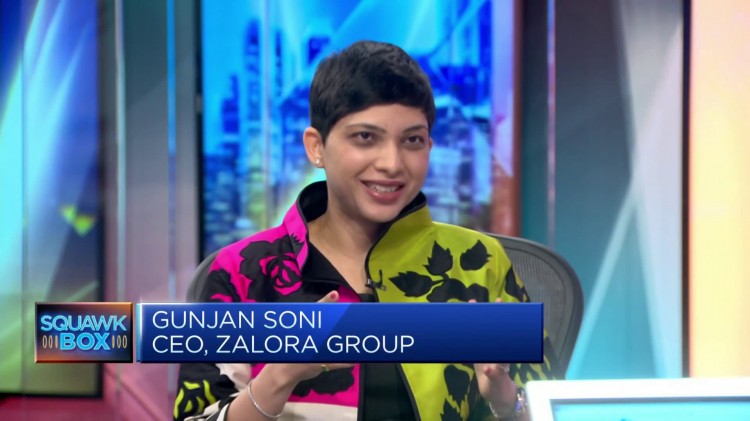時間:2024-01-30|瀏覽:315
奧地利維也納 - 2022 年 11 月 25 日:Karin Teigl 穿著愛馬仕黃色皮革迷你凱莉包、Baum & Pferdgarten 綠色皮夾克、Lumina 米色短款高領(lǐng)毛衣和復(fù)古格子綠黃色褲子。
杰里米·莫勒 |
蓋蒂圖片社
低調(diào)奢華是去年社交媒體上最火爆的時尚趨勢之一,但與 TikTok 或 Instagram 上其他曇花一現(xiàn)的時尚不同,這一趨勢已進入投資者投資組合并顯示出實際回報。
那么什么是“安靜的奢華”呢?
這一趨勢圍繞著低調(diào)、微妙的奢華展示而展開,HBO 連續(xù)劇《繼承之戰(zhàn)》等熱門節(jié)目也為提升其受歡迎程度發(fā)揮了一定作用。
時尚界大聲、浮華地展示財富的日子已經(jīng)一去不復(fù)返了——現(xiàn)在一切都是微妙和極簡主義的。
但這一趨勢不僅在時尚界受到關(guān)注,就連投資者也開始注意到。
品牌提升
長期以來,奢侈品股票一直被一些人視為對抗通脹的有效手段。
這主要是因為該細分市場的高定價很少阻礙其富裕的客戶群,而且其利潤率比電視或手機等許多其他非必需消費品高得多。
從本質(zhì)上講,該細分市場的基本面幾十年來并沒有發(fā)生巨大變化,但隨著奢侈品運動悄然興起,投資者開始挑選那些在很大程度上符合這些條件的公司。
一些公司及其品牌概括了專家所說的低調(diào)奢華的精髓,東南亞最大的銀行星展銀行的數(shù)據(jù)顯示,這些品牌在 2023 年的表現(xiàn)已經(jīng)超越了“響亮”的同行。
愛馬仕 (Hermes)
是從這一新浪潮中受益的一些頂級公司
、Prada 旗下 Miu Miu、
Brunello Cucinelli
,
歷峰集團金融公司
和
斯沃琪集團
據(jù)星展銀行稱。
2023 年,安靜奢華的表現(xiàn)將優(yōu)于喧鬧奢華。
星展銀行
星展銀行首席投資官侯偉福表示:“低調(diào)的奢侈品運動突顯了消費者對奢侈品消費微妙的偏好,專注于低調(diào)優(yōu)雅和永恒品質(zhì)的公司將與消費者產(chǎn)生共鳴,并從這一趨勢中受益。”
"Hence, in 2023, quiet luxury companies notably outperformed their loud peers by 23% points. We expect this ongoing shift in the industry's dynamics will help sustain this bifurcation in performance."
According to DBS, a company fall under its categorization of "quiet luxury" if it's understated and focused on high quality, while maintaining exclusivity and scarcity.
Some of the bank's top picks include Hermes, Moncler, LVMH Mo?t Hennessy Louis Vuitton, Richemont, Swatch, Brunello Cucinelli and Ermenegildo Zegna.
Unlike viral trends that come and go, investors are looking at these companies with a much longer term view.
"There's this element of: 'I'm tired of all the big logo stuff,'" said MarkusHansen, portfolio manager at Vontobel Quality Growth Boutique, noting that consumers and investors now want a higher quality product.
"It comes back to the heritage of these houses, which are the ones that are the most successful ... and what we invest in are the ones that take a very long term view," he told CNBC.

watch now
VIDEO3:4203:42
Consumers are still 'willing to pay the price' for the brands they love: Zalora
Squawk Box Asia
In Asia-Pacific, the demand narrative for luxury goods could be shifting due to China's uneven post-pandemic recovery and lackluster domestic demand.
Though Chinese consumers' appetite for luxury goods may not have completely dried up, luxury brands are broadening their horizons to cater to other big markets in Asia.
In Asia, mature markets like South Korea and Japan are seeing growing demand for luxury goods, Hansen said.
He added: "India is the last big market, not just the population, but in terms of the growing wealth of the population."
A recent Goldman Sachs report predicted around 100 million people in India will become "affluent" by 2027 — defined by the U.S. investment bank as those earning an annual income exceeding $10,000. Currently, 60 million people in the world's fifth-largest economy earn more than $10,000, the report said.
Quiet luxury stocks were bumped up in portfolios last year, pushing down brands that were considered too "loud."
As a result, Kering-owned Gucci & Burberry were pushed lower in global rankings of luxury stocks, Bank of America Securities research showed.
"We believe that throughout the year brands should focus back on fashion content and newness in order to re-engage customers and drive traffic," said BofA research analyst Ashley Wallace, noting that companies that are geared toward quiet luxury are better positioned this year.
BofA said it preferred companies like LVMH and Hermes over Gucci-owner Kering and Burberry.
![[斯科特]安靜的奢華如何巧妙地接管投資者的投資組合](/img/20240130/3367363-1.jpg)


![[艾略特]杰弗里·愛潑斯坦按摩調(diào)度員莎拉·凱倫安靜地等待爆炸性文件轉(zhuǎn)儲:回購協(xié)議](/img/20240102/3108864-1.jpg)
![[卡爾]谷歌工程師在晚餐時安靜地茫然地盯著,然后據(jù)稱將妻子打死:重新](/img/20240123/3308110-1.jpg)
![[海倫]漲勢顯示出疲憊的跡象如果下跌即將來臨,如何保護您的投資組合](/img/btc/107.jpeg)

![[頌歌]她的投資組合中](/img/btc/128.jpeg)
![[惠特尼]2024 年牛市拉開帷幕,讓您的投資組合多元化](/img/btc/12.jpeg)
